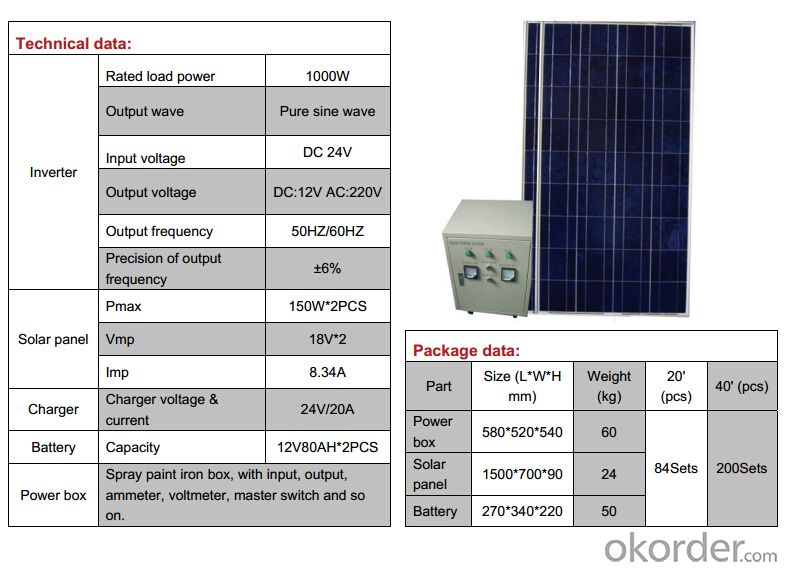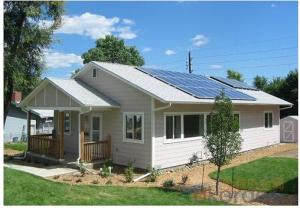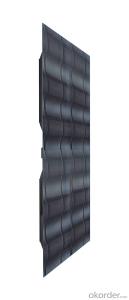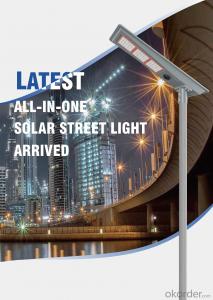solar system 300w which made in China
- Loading Port:
- China Main Port
- Payment Terms:
- TT OR LC
- Min Order Qty:
- -
- Supply Capability:
- -
OKorder Service Pledge
Quality Product, Order Online Tracking, Timely Delivery
OKorder Financial Service
Credit Rating, Credit Services, Credit Purchasing
You Might Also Like

- Q:Can solar energy systems be integrated into existing electrical systems?
- Yes, solar energy systems can be integrated into existing electrical systems. By installing solar panels on rooftops or other suitable locations, the generated electricity can be fed into the existing electrical system, reducing the reliance on traditional sources of electricity and potentially lowering energy costs. However, it is important to ensure the compatibility and capacity of the existing electrical infrastructure to handle the additional power supply from the solar energy system.
- Q:Can solar energy systems be used for powering data centers or IT infrastructure?
- Yes, solar energy systems can definitely be used for powering data centers or IT infrastructure. Solar panels can generate electricity from sunlight, which can then be used to power various electrical components in data centers like servers, cooling systems, and networking equipment. Additionally, advancements in solar technology have made it possible to store excess solar energy in batteries, ensuring a continuous power supply even during cloudy periods or at night. This not only reduces reliance on traditional power sources but also helps in reducing carbon emissions and overall energy costs for data centers.
- Q:What are the financial benefits of installing a solar energy system?
- The financial benefits of installing a solar energy system include reduced electricity bills as solar power generates free electricity from sunlight, potential savings on energy costs in the long run, decreased reliance on grid power and utility companies, potential eligibility for government incentives and tax credits, increased property value, and the possibility of selling excess energy back to the grid for additional income.
- Q:Can solar panels be installed on facades or windows?
- Yes, solar panels can be installed on facades or windows. Traditional solar panels are typically installed on rooftops to maximize sunlight exposure. However, there are now innovative solar technologies that allow for the integration of solar panels into building facades or windows. These technologies, known as building-integrated photovoltaics (BIPV) or building-applied photovoltaics (BAPV), enable the use of solar panels as part of the building's design and architecture. BIPV systems can be seamlessly integrated into the building's facade, replacing traditional building materials such as glass or cladding. This allows for the generation of solar energy while maintaining the aesthetic appeal of the building. BAPV systems, on the other hand, involve the installation of solar panels onto existing windows or as window coverings. These panels can be transparent or semi-transparent, allowing natural light to penetrate while generating electricity. Solar panels on facades or windows offer several advantages. Firstly, they provide additional surface area for solar energy generation, making the most of available space in urban environments where rooftop installations might be limited. Secondly, they can help to reduce a building's energy consumption by generating electricity on-site, thereby lowering reliance on the grid. Lastly, they contribute to the overall sustainability and eco-friendliness of the building, promoting renewable energy use and reducing carbon emissions. However, there are some considerations to keep in mind when installing solar panels on facades or windows. Factors such as the building's orientation, shading, and the quality of natural light need to be carefully evaluated to ensure optimal energy production. Additionally, the structural integrity of the building must be assessed to determine if it can support the additional weight of the solar panels. In conclusion, solar panels can indeed be installed on facades or windows through BIPV or BAPV systems. These innovative technologies offer numerous benefits such as increased energy generation, reduced energy consumption, and enhanced building sustainability. However, proper evaluation and planning are essential to ensure the effectiveness and feasibility of such installations.
- Q:Can solar energy systems be used in areas with limited access to social services?
- Yes, solar energy systems can be used in areas with limited access to social services. Solar energy systems are independent of traditional power grids and can operate off-grid, making them suitable for remote and underserved areas. These systems can provide reliable and clean energy, improving the quality of life by powering essential services such as lighting, heating, and water pumping, even in areas with limited access to social services. Additionally, solar energy systems can contribute to economic development by reducing dependence on expensive and unreliable energy sources, promoting self-sufficiency, and enabling the growth of local businesses.
- Q:Are solar energy systems expensive?
- Solar energy systems can be initially expensive to install, but they can save money in the long run by reducing electricity bills and providing a return on investment over time. Additionally, government incentives and falling solar panel prices have made solar energy systems more affordable and accessible to a wider range of consumers.
- Q:Can solar energy systems be used for powering security cameras?
- Certainly, security cameras can indeed be powered by solar energy systems. The conversion of sunlight into electricity by solar panels enables the storage of energy in batteries or direct powering of different devices, such as security cameras. Consequently, solar energy emerges as an excellent and sustainable option for remote or off-grid areas where the installation of electrical cables might pose challenges or incur high expenses. Moreover, solar-powered security cameras possess the advantageous ability to function without interruption, provided there is an ample supply of sunlight to generate electricity. Consequently, they prove to be a dependable and environmentally friendly alternative for surveillance systems.
- Q:How do solar batteries store excess energy?
- Solar batteries store excess energy by converting the surplus electricity generated by solar panels into chemical energy. This is done through a process called charging, where the excess energy is used to charge the battery. The battery then stores this energy as chemical potential energy, which can be later converted back into electrical energy when needed.
- Q:Can solar energy systems be used in areas with limited access to solar energy support networks?
- Yes, solar energy systems can be used in areas with limited access to solar energy support networks. Off-grid solar systems, also known as standalone systems, are designed to operate independently without being connected to an electricity grid. These systems can be installed in remote areas or places with limited infrastructure, allowing them to harness and store solar energy for use in powering homes, businesses, or other applications. Additionally, advancements in solar technology have made it possible to use smaller and more efficient solar panels, making them suitable for areas with limited solar resources.
- Q:Do solar energy systems require a backup generator?
- A backup generator is not always needed for solar energy systems. The primary source of power for these systems is sunlight, meaning they can generate electricity as long as there is enough sunlight. It's important to consider that solar energy systems are usually connected to the electrical grid, allowing any surplus power to be sent back to the grid when the solar panels produce more electricity than is being used. This can result in a credit or compensation from the utility company, which can help offset the cost of electricity when the solar panels are not generating enough power. However, if a solar energy system is not connected to the electrical grid and operates independently, a backup generator or an energy storage system like batteries may be necessary to ensure a continuous power supply during periods with insufficient sunlight. Ultimately, the need for a backup generator depends on the specific setup and requirements of the solar energy system.
1. Manufacturer Overview |
|
|---|---|
| Location | |
| Year Established | |
| Annual Output Value | |
| Main Markets | |
| Company Certifications | |
2. Manufacturer Certificates |
|
|---|---|
| a) Certification Name | |
| Range | |
| Reference | |
| Validity Period | |
3. Manufacturer Capability |
|
|---|---|
| a)Trade Capacity | |
| Nearest Port | |
| Export Percentage | |
| No.of Employees in Trade Department | |
| Language Spoken: | |
| b)Factory Information | |
| Factory Size: | |
| No. of Production Lines | |
| Contract Manufacturing | |
| Product Price Range | |
Send your message to us
solar system 300w which made in China
- Loading Port:
- China Main Port
- Payment Terms:
- TT OR LC
- Min Order Qty:
- -
- Supply Capability:
- -
OKorder Service Pledge
Quality Product, Order Online Tracking, Timely Delivery
OKorder Financial Service
Credit Rating, Credit Services, Credit Purchasing
Similar products
New products
Hot products
Hot Searches
Related keywords



























